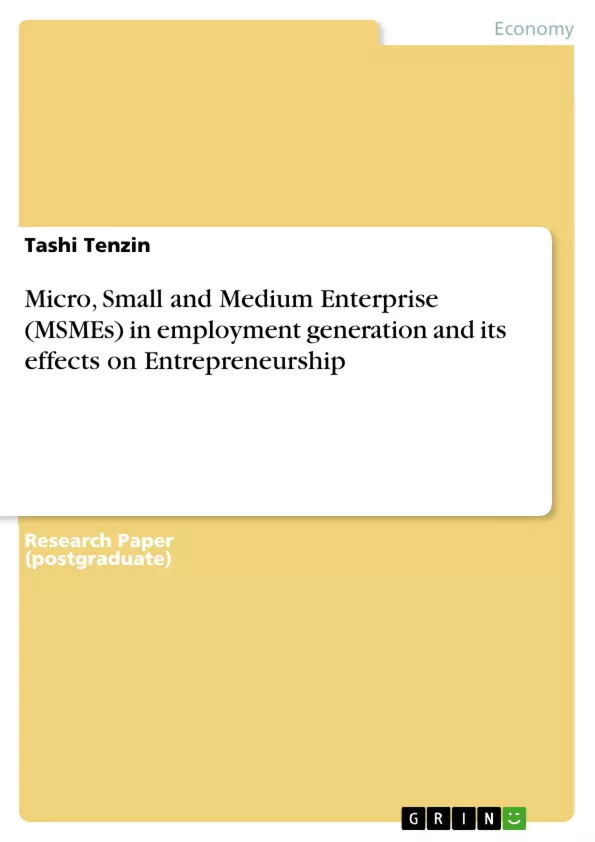The purpose of the study is to examine the role of MSMEs in solving unemployment problem and to find the unemployment trend. The unemployment problem is rising every year and especially youth unemployment is increasing at alarming rate. The study covers Thimphu area whereby a total of 351 samples were determined for the purpose of the study however the response rate was 82.05% with 288 responds qualifying for the analysis. Descriptive analysis was used and the findings reveal that most of the business owned by youth entrepreneurs employed more people though their initial investments were very low.
The study also shows that most of the present business owners has plan of expanding their business in future which will create more jobs. From the studies, it shows that unemployment rate in Bhutan fluctuates and is mainly because of change in the supply and demand in the job markets. It also shows that despite high unemployment rate in the country, preferences for job among the youth remain same. They prefer to join civil servants followed by corporations, NGOs and self-employment or entrepreneurship as the last option.
From this preferences of job and trend of high unemployment rate in the country, it can conclude that there is no refugee in the country nor can say that there is entrepreneurial effect as the entrepreneurship culture in the country is in the verge of developing, therefore entrepreneurial effect can only be tested after some years when the entrepreneurship culture in the country is fully developed.
Inhaltsverzeichnis (Table of Contents)
- Chapter I: Introduction
- 1.1. Background to the study
- 1.2. Statement of the problem
- 1.3. Aims and Objective of the study
- 1.4. Research questions
- 1.5. Significance of the study
- 1.6. Definition of concepts
- Chapter II: Literature Review
- 2.1. The relationship between growth of MSMEs and employment
- 2.2. Linking entrepreneurship and unemployment
- Chapter III: Research Methodology
- 3.1. Research design
- 3.2. Population and Sample size
- 3.3. Response rate
- 3.4. Data collection
- 3.5. Method of Data analysis
- 3.6. Ethical consideration
- Chapter IV: Data Analysis and Findings
- 4.1. Demographic profile of the respondents
Zielsetzung und Themenschwerpunkte (Objectives and Key Themes)
This study investigates the role of MSMEs in addressing the unemployment problem in Bhutan and aims to identify the trends of unemployment. The research explores the impact of MSMEs on entrepreneurship and employment creation in the context of a growing economy with high unemployment rates, particularly among youth.
- The role of MSMEs in employment generation and mitigating unemployment in Bhutan.
- The relationship between entrepreneurship and unemployment in Bhutan.
- The impact of government policies and initiatives on the growth and development of MSMEs.
- The challenges and opportunities faced by MSMEs in Bhutan.
- The potential of entrepreneurship to address the unemployment problem in Bhutan.
Zusammenfassung der Kapitel (Chapter Summaries)
Chapter I: Introduction
The first chapter presents the background of the study, highlighting the rapid economic growth in Bhutan coupled with significant unemployment rates, particularly among youth. It introduces the importance of MSMEs in fostering entrepreneurship, generating employment, and reducing poverty, and discusses the government's efforts to promote entrepreneurship and the growth of MSMEs. This chapter outlines the study's objectives, research questions, and significance.
Chapter II: Literature Review
This chapter reviews existing literature on the relationship between the growth of MSMEs and employment, and the link between entrepreneurship and unemployment. It explores the theoretical frameworks and empirical evidence regarding the role of MSMEs in economic development and employment creation.
Chapter III: Research Methodology
This chapter outlines the research design, population, sample size, response rate, data collection methods, and data analysis techniques employed in the study. It also addresses ethical considerations related to the research.
Chapter IV: Data Analysis and Findings
Chapter IV presents the analysis of the collected data and discusses the key findings of the study. It examines the demographic profile of the respondents and explores the relationship between MSMEs, entrepreneurship, and employment in Bhutan.
Schlüsselwörter (Keywords)
The main keywords and focus topics of this research include entrepreneurship, unemployment, MSMEs, youth, employment generation, economic growth, government policies, and entrepreneurial effect.
Frequently Asked Questions
What is the main objective of this study on MSMEs in Bhutan?
The study examines the role of Micro, Small and Medium Enterprises (MSMEs) in solving the unemployment problem in Bhutan and identifies unemployment trends.
What are the job preferences of youth in Bhutan according to the findings?
Youth in Bhutan primarily prefer joining the civil service, followed by corporations and NGOs. Self-employment or entrepreneurship is often seen as the last option.
How do MSMEs contribute to employment generation?
The findings reveal that businesses owned by youth entrepreneurs employ more people even when their initial investments are low, and many owners plan to expand in the future.
What is the "entrepreneurial effect" mentioned in the study?
The study concludes that the entrepreneurial effect can only be fully tested in a few years, as the entrepreneurship culture in Bhutan is still in the process of developing.
What methodology was used for this research?
The study used descriptive analysis based on 288 valid responses from a sample of 351 in the Thimphu area.
- Arbeit zitieren
- Tashi Tenzin (Autor:in), 2014, Micro, Small and Medium Enterprise (MSMEs) in employment generation and its effects on Entrepreneurship, München, GRIN Verlag, https://www.grin.com/document/424945



